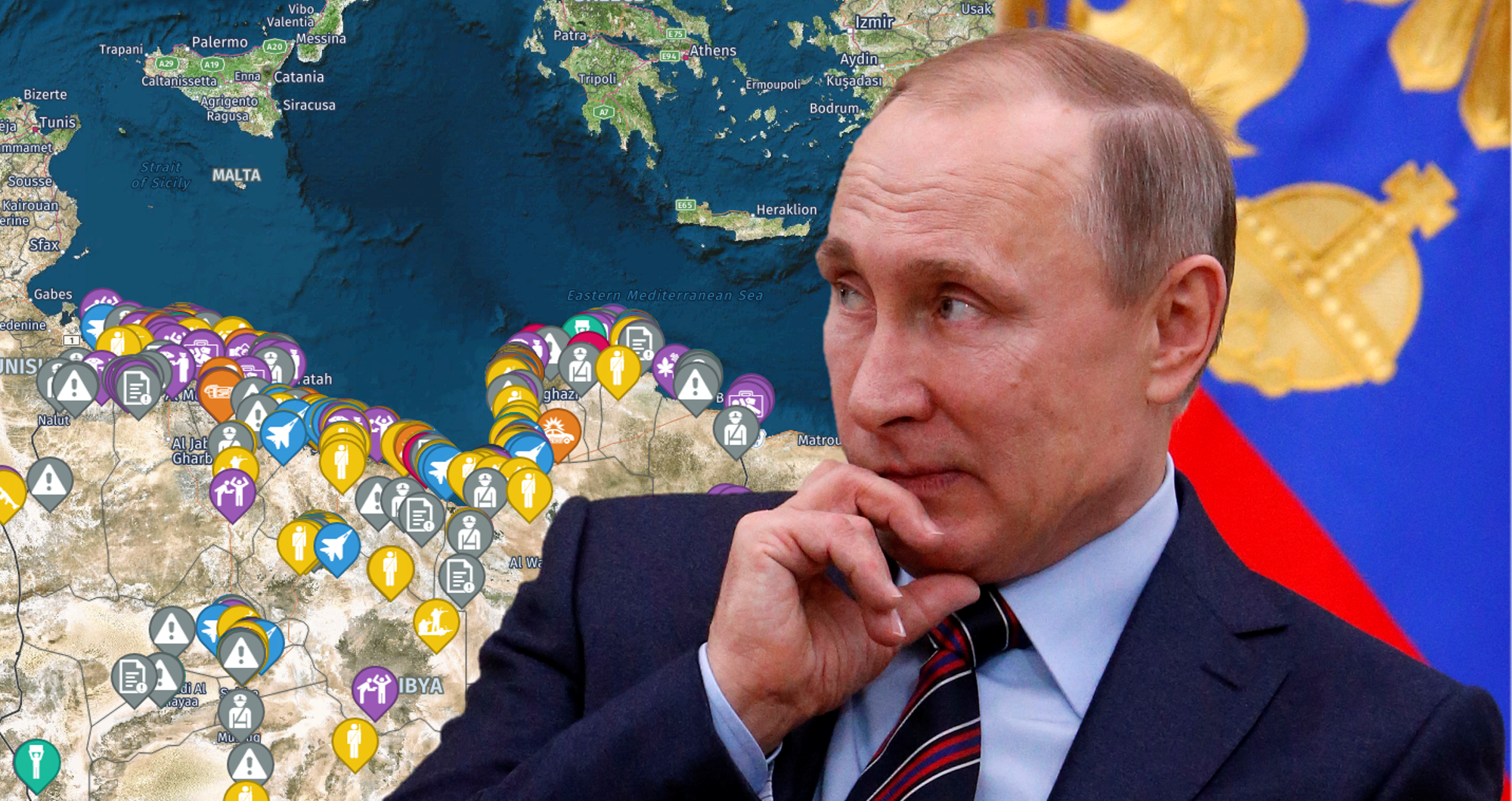Libya: Russia’s Next Front?

Arab Spring to civil war
Libya has had a tragic few years. After the gruelling stability of Colonel Gaddafiâs reign ended in the Arab Spring, thanks in large part to a brief and violent NATO intervention, peace and democracy have not flourished. Since 2014 the country has been at war with itself, with several different groups claiming authority over some or all of Libya. In 2016, a UN-backed government arrived in Tripoli. However, this Government of National Authority (GNA), despite its international support, is far from unchallenged.[1]
Libya has not received the same level of coverage that Syria or Iraq have. When the country has hit the headlines it has been because of ISIS. The idea that Libya might become the main ISIS redoubt following its looming defeat in Iraq and Syria had been widely rejected after the organisationâs main foothold in Libya, the coastal city of Sirte, fell to US-backed Libyan militias in late 2016.[2] However, it is becoming increasingly plausible that the Manchester bomber Salman Abedi was affiliated with the Libyan ISIS organisation, suggesting the organisation is not quite a spent force.[3]
While ISIS is still projecting pain from Libya, it is not the greatest threat to Libyaâs officially recognised government. That dubious honour falls to General Khalifa Haftar, his Libyan National Army (LNA) and the Tobruk-based House of Representatives. Haftar, the House and the Army are all theoretically affiliated with the GNA, but instead have been competing with it for control of the valuable port cities of Libyaâs âoil crescentâ (though they are not yet fighting each other). If the port cities are Libyaâs arteries, keeping the country alive, then the conflict is clogging them, and killing its chance of recovery.[4]
Good neighbours to have: UAE and Egypt
General Haftar has been benefiting from the patronage of the United Arab Emirates and Egypt during the Libyan Civil War. Egyptâs president has a clear geopolitical reason for backing Haftar: Egyptâs long border with Libya is hard to police. Egypt has a serious Islamist problem. A porous Libyan border would allow Egyptâs Islamist enemies to operate transnationally, improving access to recruits and arms. Egypt has provided arms and trainers to the LNA.[5] More recently, the Egyptian air force responded to (or exploited) a massacre perpetrated in Egypt by striking at a faction in Libya opposed to the LNA and only dubiously tied to the domestic terrorist attack. Plausibly, President al-Sisi took advantage of the attack to support Haftar, perhaps emboldened by President Trumpâs recent visit and focus on battling Islamism even at the cost of longer-term benefits.[6] In fact, Egyptâs support of Haftar, who is such a menace to the UN-backed GNA, means it is operating against US objectives in Libya.
The United Arab Emirates is also supporting Haftar. The UAE and Egypt have a longstanding anti-Islamist relationship, with Abu Dhabi supporting Egyptâs military government following its ousting of Muslim Brotherhood President Morsi. Neither Abu Dhabi nor Cairo want Islamists in Libya. Furthermore the UAE has been involved in a proxy conflict with its neighbour Qatar over the fate of Libya since the popular uprising against Gaddafi in 2011. The UAEâs support of Haftar and the LNA represents a continuation of this policy.[7] As recent events have shown, Qatar and the UAE remain implacable foes: the UAE has recalled all diplomats from Qatar as part of a wider Gulf Cooperation Council protest against Qatarâs perceived support of the Muslim Brotherhood specifically, and Islamism generally.[8] As well as encouraging Egyptâs intervention, the UAE has also funded mercenaries in Libya.[9]
Russiaâs new front
The opposition Egypt and the UAE are mounting against the UN-backed GNA in Tripoli. This alone would be sufficient to raise serious doubts about Libyaâs future, however, concerning reports have emerged that Russia has become involved in the conflict as well. Moscow has been feting General Haftar, recently receiving him on the Russian Navyâs aircraft carrier, the Admiral Kusentsov. This reception occurred as the carrier floated off the coast of Syria.[10] In Syriaâs present we might glimpse Libyaâs future: a Russian-backed strongman violently taking control of a fractured Middle Eastern state, to the impotent consternation of the wider world.
Russian military personnel and equipment have been reported arriving in two Egyptian airbases, Sidi Barrani and Marsa Matrouh. Reuters quotes American and Egyptian security sources, revealing the presence of drones and at least 22 Russian special forces members.[11] The speaker of Tobrukâs House of Representatives said Russia had promised aid in the fight against terrorism.[12] Russia is also arming the Libyan National Army.[13] It is possible the Russian presence on Libyaâs border is part of its close military relationship with Egypt, perhaps ensuring the conflict does not spread eastwards. On the other hand, Russiaâs recent military actions in Ukraine and Syria suggest a deeper involvement cannot be discounted.
What would Russia gain from a deep, if relatively covert, intervention into the Libyan civil war? Firstly, it would gain influence in Libyaâs future. Haftar has been courted by Moscow, but the leader of the GNA, Serraj has also received attention. Regardless of the outcome of the conflict, Russia can ensure a seat at any negotiating table. If it backed the GNA, it would be merely be one of many falling into line behind the US. By supporting Haftar but keeping options open, Russia must be included in discussions about Libyaâs future. If Haftar takes control of Libya, or lead an eastern Libyan secession, Russia retains influence. If he loses, Russia has hedged its bets.[14] A recent meeting between Haftar and Serraj in Abu Dhabi suggested Russia may be in for the best of both worlds, as Haftar appears to have been validated as a necessary player in the GNAâs and Libyaâs future.[15]
Intervention in Libya would be part of a wider Russian display of power-projection in the Middle East. It has already improved relations with Egypt and Turkey, two traditional American allies. It has also effectively ended the Syrian civil war in favour of long-time ally Assad. Haftar was part of the US-backed effort to remove Gaddafi in 2011. By poaching him, Russia has ensured it is taken seriously in the region and further afield. It is broadcasting the return of the multipolar world at the same time as Donald Trump appears to be leading an international American retreat.[16] Russiaâs intervention in Crimea was unique: Ukraine is culturally, historically and geographically connected to Russia. Crimea was part of Russia until 1954.[17] Its intervention in Syria also has well-established reasoning behind it: the Assad family has long been a friend to Moscow and vice versa. The naval base at Tartus alone gives Russia a vested interest. Libya is different. While Russia was a friend to Gaddafi, intervention on behalf of the eastern Libyan rebels would show a pragmatic, even mercenary attitude towards foreign adventures: where Russian interests could benefit, Russia may appear.
A Russian presence in Libya might be advantageous to Russia in the long term.Italian media reported an agreement with Haftar for two bases near Tobruk and near Benghazi.[18] These bases would complement the Russian naval base in Tartus and increase Russiaâs presence in the Mediterranean, increasing its attractiveness as a potential ally to any in the region. In grand strategic terms, Russia has historically struggled with access to warm water, as many of its ports freeze in winter or are in the Black Sea and therefore dependent on Turkeyâs control of the Bosphorus and Dardanelles. The more bases Russia can gain in the Mediterranean, the greater its ability to project power without these two handicaps. While the Russian Navy will never be able to compete with that of the US, more Russian ships in the Mediterranean (and the Suez Canal, and close to many EU and NATO countries) would be significant.
Russia has been accused of using refugees as political weapons. Its violence in the Syrian civil war was considered in part designed to exacerbate the exodus of refugees from Syria to Europe, straining the European Unionâs internal cohesion (the refugee crisis was an important issue during the Brexit referendum, for example). Refugees and migrants from Libya have also caused tension between Italy and other European Union states.[19] Russia could exacerbate this flow by using the same indiscriminate tactics it has already used in Syria, all while using the same excuse of battling terrorism.[20]
Libya is the most oil-rich country in Africa. Russia was heavily invested in Libyan oil before violence broke out in 2011. Haftarâs forces have been involved in see-saw fighting for Libyaâs âoil crescentâ. Russiaâs oil industry is a major source of the countryâs revenue. Looking to the future, a sympathetic Haftar, in control of the oil crescent thanks to Russian support, might look kindly to the return of Gazprom et al.
Finally, there are two military advantages to the rumours of at least 22 special forces members operating in Libya, as well as the wider deployment. As in Syria, it is good for the Russian military to perform in an active but not existentially threatening conflict: win, and the military gains valuable experience. Lose, and the military gains very valuable experience. Secondly, the potential presence of Russian infantry operating alongside Libyan militias might give the US pause should the GNA require military support against the LNA: a Russian killed by an American bomb could have catastrophically dangerous consequences.
Little to lose
In summary, Russiaâs involvement in Libya has already strengthened its reputation as a power-broker and a friend to those in need of one, in the face of the UN and the USA. It also stands a good chance of profiting regardless of the outcome of the conflict, either with Haftarâs offered bases, Libyaâs oil or a relationship with the GNA. Perhaps even all three. Influence in Libya can be translated into pressure on the European Union via the weaponisation of refugees (especially if even a single refugee proves to have the same mindset as Salman Abedi). Finally, the subtlety with which it has become involved (the US military is cagey about declaring the presence of Russian troops because they may be out of uniform) makes armed support of the GNA that much less palatable. In Libya, Russia has nothing to lose and much to gain.
[1] http://www.ecfr.eu/mena/mapping_libya_conflict
[2] https://www.theguardian.com/world/2016/dec/05/isis-loses-control-of-libyan-city-of-sirte
[3] https://www.nytimes.com/2017/06/03/world/middleeast/manchester-bombing-salman-abedi-islamic-state-libya.html
[4] https://www.weforum.org/agenda/2016/05/which-economies-are-most-reliant-on-oil/
[5] https://www.alaraby.co.uk/english/news/2017/3/7/egypt-scrambles-to-save-libyas-haftar-over-lost-oil-fields
[6] http://www.reuters.com/article/us-egypt-security-analysis-idUSKBN18R2GE
[7] http://www.huffingtonpost.com/giorgio-cafiero/the-uae-and-qatar-wage-a-_b_8801602.html
[8] http://edition.cnn.com/2017/06/05/middleeast/saudi-bahrain-egypt-uae-qatar-terror/index.html
[9] http://warisboring.com/erik-princes-mercenaries-are-bombing-libya/
[10] http://www.telegraph.co.uk/news/2017/03/24/russian-troops-ground-libya-us-general-claims/
[11] http://www.reuters.com/article/us-usa-russia-libya-exclusive-idUSKBN16K2RY
[12] https://www.theguardian.com/world/2017/mar/14/russian-special-forces-deployed-in-egypt-near-libyan-border-report
[13] https://www.chathamhouse.org/expert/comment/moscow-s-presence-libya-new-challenge-west
[14] http://www.reuters.com/article/us-usa-russia-libya-exclusive-idUSKBN16K2RY
[15] http://www.aljazeera.com/indepth/features/2017/05/haftar-serraj-meeting-libya-170511110810139.html
[16] http://www.newsweek.com/how-russia-became-middle-easts-new-power-broker-554227
[17] https://www.wilsoncenter.org/publication/why-did-russia-give-away-crimea-sixty-years-ago
[18] http://www.aljazeera.com/indepth/features/2017/01/russia-endgame-libya-170116061913370.html
[19] http://www.bbc.co.uk/news/world-europe-39686239
[20] http://www.bbc.co.uk/news/world-europe-35706238
Report written by Brendan Clifford
